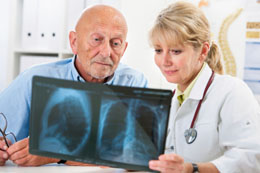Pain and tenderness under the right rib cage could be caused due to a wide range of reasons. This Buzzle write-up lists out the contributing factors.

More often than not, pain or tenderness around the rib cage could be due to the inflammation of the intercostal muscles. Tenderness might be experienced in the event of trauma to the chest. If the pain persists even after using analgesics or anti-inflammatory drugs, it's advisable to seek medical help. It's possible that the pain might be emanating from any of the organs located in the upper abdominal region. The following sections list out the causes for pain and tenderness around the right rib cage.
Contributing Factors
The severity of the pain might vary. Some of the possible causes of pain and tenderness around the right rib cage are listed below:
➠ Kidney stones, which are also referred to as renal calculi, are stone-like deposits that form due to crystallization of minerals such as calcium, oxalate, or uric acid in the urine. If the kidney stone is large, it could get lodged in the kidneys or the ureter. Under this circumstances, the affected person is likely to experience excruciating pain. The pain is experienced in the flank region. It spreads from the back to under the rib cage.
➠ The likelihood of pain and tenderness under the rib cage would be greater in the event of trauma to the rib cage. A blow to the rib cage, motor vehicle accidents in which the ribs get slammed against the steering wheel, an accident in which something heavy falls on the chest, falls, etc., could cause the ribs to develop cracks or fracture.
➠ The gallbladder is a pear-shaped sac that is located under the liver. It stores and concentrates bile, which is the digestive juice that is produced by the liver. The gallbladder could become inflamed due to the presence of gallstones. Gallstones are hardened deposits that form when the concentration of cholesterol or bile pigments in bile is higher than usual. When the gallbladder becomes inflamed due to the presence of gallstones, one is diagnosed with cholecystitis. This condition could give rise to symptoms such as dull or sharp abdominal pain, bloating, cramping, pain in the upper right section of the abdomen, pain that spreads to the back or below the shoulder blades, etc.
➠ Costochondritis is a medical condition that is characterized by the inflammation of the costal cartilage, which is the cartilage that connects the ribs to the sternum. Trauma, physical strain, infections, or violent coughing could be the contributing factors for this condition. In case of individuals affected by costochondritis, the affected rib joint is tender to touch. Pain usually worsens while taking deep breaths.
➠ At times, crush injuries could cause ribs to break and get separated from the rest of the chest wall. This condition is called
flail chest. The sections of the broken ribs interfere with the normal chest movements. As a result, the chest is unable to expand properly, and air cannot be properly drawn into the lungs. Such crush injuries can also cause tenderness and inflammation of the muscles around the rib cage. It is a serious medical condition and needs to be treated immediately.
➠ There are times when pain under the rib cage could actually be due to gas. Pain might actually be due to gas that is trapped in the hepatic flexure, which is the sharp bend between the ascending and transverse colon. It is called hepatic flexure, as it is adjacent to the liver.
➠ At times, pain and tenderness could occur due to respiratory infections.
Trauma to the chest is one of the main reasons behind pain and tenderness around the rib cage. Since rib cage protects the vital organs such as the lungs and the heart, medical assistance must be immediately sought in the event of an injury. Pain could even emanate from internal organs. Imaging procedures such as chest X-rays, ultrasound, or MRI can help determine the extent of damage due to an injury or any medical condition.
Disclaimer:
The information provided in this article is solely for educating the reader. It is not intended to be a substitute for the advice of a medical expert.


 More often than not, pain or tenderness around the rib cage could be due to the inflammation of the intercostal muscles. Tenderness might be experienced in the event of trauma to the chest. If the pain persists even after using analgesics or anti-inflammatory drugs, it's advisable to seek medical help. It's possible that the pain might be emanating from any of the organs located in the upper abdominal region. The following sections list out the causes for pain and tenderness around the right rib cage.
More often than not, pain or tenderness around the rib cage could be due to the inflammation of the intercostal muscles. Tenderness might be experienced in the event of trauma to the chest. If the pain persists even after using analgesics or anti-inflammatory drugs, it's advisable to seek medical help. It's possible that the pain might be emanating from any of the organs located in the upper abdominal region. The following sections list out the causes for pain and tenderness around the right rib cage.